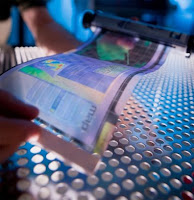I recently entered my final year as a “thirty-something.” And, no, I never watched that show. In fact, they had some sort of reunion on the morning news recently and I didn’t rec
 ognize a single one of the actors.
ognize a single one of the actors.Regardless, I said goodbye to 38 in quiet contemplation. Contemplation of how much I love my family and how much I love Reese’s Peanut Butter Cups. My wife, being uniquely attuned to my tastes, rewarded me with a “cake” made of stacked peanut butter cups. With a candle on top!
Also, I got a Reese
 ’s T-Shirt to go with my Inigo Montoya T-shirt. And imagine that – despite having lived my whole 39 years in Syracuse, home of the Syracuse University Orangemen (or just “The Orange” as local newscasters tend to call them), this was the first orange garment I’ve ever owned. Apparently, orange suits me. Who knew?
’s T-Shirt to go with my Inigo Montoya T-shirt. And imagine that – despite having lived my whole 39 years in Syracuse, home of the Syracuse University Orangemen (or just “The Orange” as local newscasters tend to call them), this was the first orange garment I’ve ever owned. Apparently, orange suits me. Who knew?But my 30s were an interesting time for me. I did all of my executive-level work in my 30s, and I may or may not ever go back to that life. It certainly had its perks, but the level of stress, the long hours, and the number of people who seemed to make it their business to frustrate my efforts to accomplish anything useful were tedious at best.
And at the end of my 30s, here I am circling back to where I was in my mid-20s – pursuing the life of a writer as I’d initially planned to do when I graduated with a Bachelor’s in English. It’s not an especially obvious choice – to go from an experienced and reasonably successful businessman, where I know the ropes, the rules, and the players (even if I often didn’t like all of the rules or players), into the publishing world where I know none of those things. As former-IT-guy-turned-writer Mil Millington told me recently about getting published, “Luck is the main thing.” That or already being famous for something. I’m not famous, but reflecting on my life I’ve certainly been obscenely lucky in a wide range of different ways large and small (or “blessed,” if you lean in that direction), so maybe I do have a shot.
I should probably write something first, though. I’ve hit a bit of a snag on that front. Onondaga Community College found themselves desperately in need of an experienced computer teacher this semester, as their enrollment soared by 20%. I heard the call to lend my Alma Mater (one of them, anyway) a hand, and was hired essentially the day before class started. But the time I’ve spent preparing for and teaching this class each week has seriously drained my available writing time. Which isn’t to say that I couldn’t possibly have gotten some writing done somehow, some way, in some fashion limited or otherwise. If I were better at shifting gears and managing my creative efforts I’m sure I could have come up with something, but I find that writing requires a lot more focus and concentration than other day-to-day work and the stress of getting my course materials structured to my satisfaction has provided both a real and a convenient excuse to accomplish nothing else. Which also serves to stress me out, as I really do want to get cranking on my first novel.
In my defense, I am emphatically NOT watching The View when I ought to be working. In fact, every so often TiVo will automatically kick over from its “Now Playing” screen (where I sometimes leave it when I’m done watching the morning news) to whatever’s on live TV at the moment, which sometimes happens to be The View. In many of those instances, I find myself deep in the middle of some worthy task and thus I don’t immediately reach for the remote to turn it off. But after just a few minutes of screeching and caterwauling from the panel of screechers and caterwaulers, I sure wish I had. Then I do.
And thus do I charge ahead (or lumber along, let’s be honest) into the final year of my thirties. Will I write a book? Or several books? Will I continue to teach for OCC? Will I continue to pursue a Master’s? Will NBC order additional episodes for Chuck? All of these questions and more will be answered before I turn the big four-oh.








